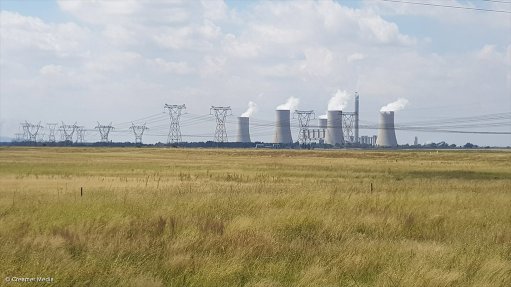
The Lethabo power station
Photo by: Creamer Media's Terence Creamer
A study commissioned by Greenpeace Africa recommends that State-owned Eskom, as part of its reform, gradually spin out its coal-fired power generation activities to new generation companies that will operate the power plants for the remainder of their operating lives.
Greenpeace had commissioned energy economist Professor Dr Uwe Leprich to compile the study, titled ‘Eskom: A roadmap to powering the future’, as it believes the utility needs a new business model, given that its debt is approaching R500-billion and that the South African economy is contacting.
“Fundamental reforms of the South African electricity sector and Eskom’s business model are inevitable and urgent.
“Eskom’s reform is almost laughably overdue; the utility is technically insolvent, inefficient, unable to guarantee security of supply, wildly unprepared for an energy transition to renewable energy and is the country's biggest emitter of toxic pollutants and greenhouse gases, which are driving us towards a climate and pollution emergency,” says Greenpeace Africa senior political adviser Happy Khambule.
He states that the roadmap provides solid options for the country’s electricity supply industry crisis, outlines a realistic and sustainable future for Eskom and ensures that all crucial functions of the South African electricity system improve.
The study considered several international experiences and trends of phasing out coal and unbundling and breaking up absolute monopolies in the electricity sector.
It recommends the refinancing of Eskom through the decommissioning of coal-fired power stations older than 40 years and the sale of all remaining coal-fired power plants, along with strict conditions in terms of the power stations’ compliance with existing air quality and environmental regulations and clear timelines for their closure.
Greenpeace emphasises that overhauling the country’s electricity sector must be accompanied by at least two key elements – a coal phase-out law, which gradually but completely phases out coal-fired power generation by 2040; and a Just Transition process that engages all key stakeholders in a dialogue that should lead to a series of negotiations on a social compact.
“South Africa must prioritise the well-being of people living and working in the coal regions by ensuring the finalisation and implementation of a Just Transition plan,” the organisation says.
The study also proposes the introduction of an independent transmission operator to improve the security of electricity supply and provide fair access for new renewable power plants such as wind and solar.
Greenpeace recommends that the independent power producer auctions for renewable energy be opened up to Eskom and that it become a significant part of the utility’s business model.
There is also the possibility for Eskom to participate in newly created regional electricity distributors.
Lastly, there is the opportunity for Eskom to create new services for end-use customers based on the digitalisation revolution that is evolving globally.
Implementing these recommendations will give Eskom an opportunity to stabilise its financial position, reduce its debt and become a constructive promoter of the necessary transition of the electricity sector to renewable energy in South Africa, says Greenpeace.